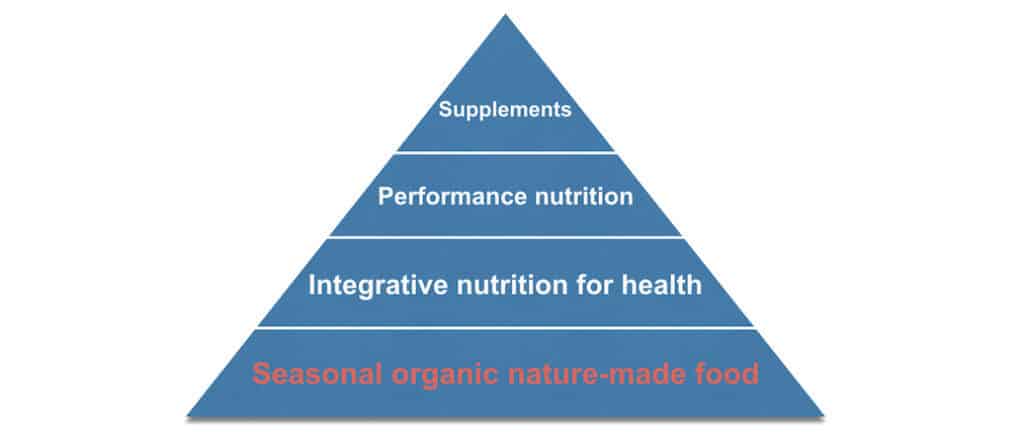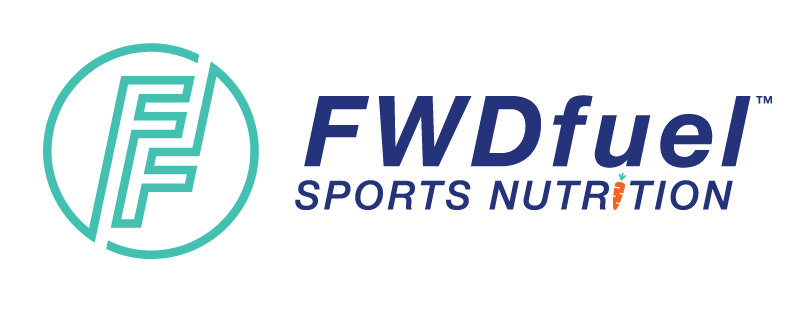The following is a post written by one of the top sports dietitians in the world, Ian Craig, BSc MSc DipCNE INLPTA. Sharing his wisdom from across the pond in the UK, we’re incredibly thankful for Ian sharing. If you want to learn more about Ian, head over to his website to read about The Centre for Integrative Sports Nutrition.
How Integrative Sports Nutrition Started
Integrative (or functional) sports nutrition is a field of study that I’ve been trying to develop for the past decade. It started in 2007, when as a nutritional therapy practitioner and lecturer, I was asked to put together a course in sports nutrition for the Centre for Nutrition Education in the UK.

There were 101 books on sports dietetics, which analyzed the constructs of calories and macronutrient needs for athletes to the nth degree, and then there were the fields of nutritional therapy, functional medicine, and integrative medicine, with their associated texts. Needless to say, I couldn’t find the course textbook that I was looking for, and to-date, one still hasn’t been written, so I pulled scientific studies from all of the above areas to assemble my course, inviting functional practitioners with an interest in sport to lecture on the course.
Fast forward 10 years and the course (Personalised Sports Nutrition) that I initially developed is still running, I edit the Functional Sports Nutrition magazine, we have an annual conference in functional sports nutrition, and now I’m putting together a new post-graduate course in the subject (CISN), which will arrive in 2018.
So, things have moved on in our understanding of the human body and how it interfaces with food, but most practitioners are still wrapped up in a quantitative understanding of nutrition: e.g. how many calories, how many grams of carbs, proteins and fats should a particular athlete be consuming? Nutrition is individualised only to the point of quantity, but the same poor quality breakfast cereals, breads and commercial meat and dairy products are still being promoted by some quite esteemed sports nutrition experts, without notable respect for the concept of quality.
What is Integrative Sports Nutrition?
A qualitative view of sports nutrition starts to focus on food sources, as represented in the pyramid below. Considerations of human health include certain key words, including; organic, seasonal, local, grass-fed, soil quality, traditional practices, fermented foods, stocks etc. If we can nourish our athletes with very high quality foods, it by-passes many of the health complaints that arise from lack of micronutrient and phytonutrient intake and long-duration toxicity, which resides in our commercial foods.
Moving to the next level of the pyramid, functional or integrative practitioners view athletes as complete genetically individual beings with unique health requirements. These include; gastrointestinal, biotransformation and detoxification, immune, musculoskeletal, endocrine, nervous, emotional and psychological needs. It is no longer acceptable to paint each athlete with the same one-size-fits-all brush with the only discernment of difference being that of macronutrient quantity.
An example might be an athlete, who after detailed computer analysis, is recommended to eat x grams of carbs per day spread over x number of meals and snacks, is given dietary suggestions of bran flakes or Wheaties for breakfast, sandwiches for lunch and pasta-based dinners. What would happen to his health (and therefore stability of his performance pyramid) if he has a chronic sensitivity to modern wheat products? This was me 20 years ago, while trying to establish myself as a runner – dutifully following dietary software outputs to the tee, I blamed my constant gut issues on the stress of my training, but the cheddar cheese sandwiches at lunch probably didn’t help too much…
Where the Future of Integrative Sports Nutrition is Taking Us
We need to go way beyond simple dietary observations and adjustments to ‘grow’ an athlete though: due consideration for his or her genetic polymorphisms, amino acid metabolism, endocrine function, bioenergetics, neurotransmitter pathways, intracellular infections and mitochondrial health, is how an integrative practitioner practices. They aim to understand their client, their athlete (whether elite or recreational), as fully as possible so that he or she is allowed to flourish health-wise. Only then are we able to load them with heavy daily training and specialized sports nutrition strategies (as shown in tier 3 of the pyramid), such as nutrient timing. If their health is good, their adaptability to training will be good. If their health is shaky and if, for example, they are suffering from borderline adrenal or thyroid fatigue issues or pituitary imbalance, or sympathetic nervous system over-functioning, they will burn-out or injure or become ill before they can reach their potential. Many athletes meet this fate and do not get the chance to see how good they can be, and that is a crying shame.
Integrative sports nutrition has the vision of helping athletes, who are under our care, to experience a long and healthy sporting career, with sporting excellence and enjoyment as their ultimate outcomes.
Interested in the Roots of Integrative Sports Nutrition?
Check out Functional Sports Nutrition magazine, started in late 2009 to view the original article that introduced this topic, or Click here.
I recently delivered four webinars for Human Kinetic publishers and the British Association of Sport and Exercise Sciences. To listen to my introduction of integrative sports nutrition, please Click Here.








